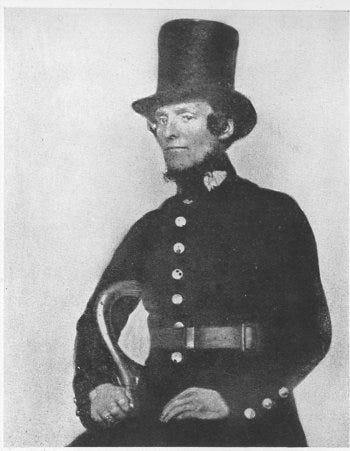Alfred Darling was a career policeman, having joined the Metropolitan Police at the age of 18, in 1868, and retiring after 25 years in 1894. By the time he retired, aged 44, he was Chief Inspector, on a a weekly salary of £4 3s. After he retired, he briefly set up as a private detective - and I’ll be covering this spell of his career in a future post.
Alfred was a family man, having married his wife Mary four months after joining the police. The couple had seven children, with two of the youngest being Lewis Sydney and Stanley Oscar, born in Battersea in April 1878 and December 1880.
The Darling sons must have grown up with their father telling them tales of his detective work and career; it must have been fascinating listening to stories of tracking down offenders and bringing them to justice. Second son George was working as a police constable by 1891, and the two youngest boys decided, as young men, to set up as private detectives.
They advertised themselves not as Lewis and Stanley Darling, but as William and Oscar Darling.* Lewis was operating as a private detective by 1901, when he was listed as such in the census. Both he and his younger brother (who was known as Oscar, not Stanley) were still living at home, but Oscar, at 20, was working as a tobacconist’s assistant, and joined his brother in business later. In 1908, however, they were both listed in the Post Office directory as private detectives. By this time, their police pensioner father, Alfred, had been dead five years, having enjoyed his pension for less than a decade.
Afterwards, things changed again. In 1911, Oscar described himself in the census as an inquiry agent and detective, self-employed, but his older brother had now gone to the movies - in one sense, at least, in that he was now working in Brixton as a bioscope operator.
However, he seems to have continued working alongside Oscar in his spare time, as the two continued to be listed as private detectives in directories certainly until 1920. Initially, they had listed their address as being 22 Henrietta Street, but for 12 years, their office address was consistently given as 33 Henrietta Street in Covent Garden (shared with The Idler magazine’s offices) - traditionally, the home of Westminster private detectives was primarily in the Covent Garden area, and detectives such as Maurice Moser had also worked in this area.
An earlier depiction of Covent Garden, where the private detectives were based in the early 20th century
Although the brothers did not work as private detectives their whole lives, Oscar certainly seems to have maintained an interest in policing. The 1939 Register records him as a commission agent, but also as a special constable in his new hometown of Hove.
Older brother Lewis seems to have gone through a difficult patch, as a Lewis Sidney [sic] Darling was accused of stealing in 1927, at which point, he was working as a poultry farmer in Essex. He had previously (in 1921) been living in Kent, but subsequently moved to Hove, presumably to be near to Oscar. The two, who both married, died within four years of each other, in 1950s Sussex.
Postscript: As Lewis’s theft charge (which he was acquitted of) suggests, at least three of the four Darling boys had chequered lives and careers, despite their father’s stable police career. Ernest was in the army before becoming a porter for the railways, based at Bermondsey, a cinema attendant, and then a caretaker. He was admitted to his local workhouse in 1912. George, after working as a Westminster police constable, seems to have lived in Honduras for a while, marrying a local woman and having his first child there. The family then moved to Rochdale and Birkenhead before settling in Birmingham. In 1922, a man of the same name was convicted of deserting his wife and children in Birmingham and sentenced to a month in prison; he was then sentenced to a further month, it being found out that he had not only deserted his wife, but then committed bigamy in Nuneaton with a lady named Amelia Wale.
* I have searched for anyone of the name of ‘William Darling’ who could have been a bona fide private detective under their real name, but have been unable to do so. Given the connection with Oscar Darling, and their family’s history in detective and police work, it seems the only plausible explanation for ‘William and Oscar Darling’ is that it was Lewis and Oscar, with Lewis operating under a different first name. Why he would feel the need to do this is as yet unexplained.





